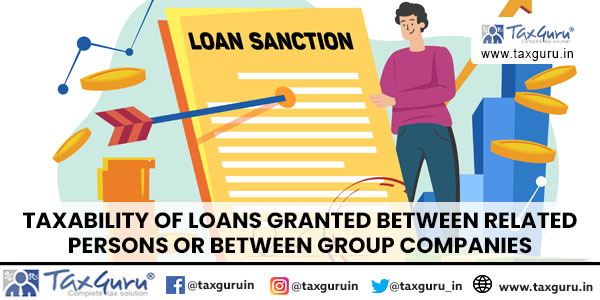Background:
In the recent times, GST Department by exercising the powers bestowed on them by way of Section 65 of the CGST Act 2017, has been raising the audit observations stating that GST shall be paid on the inter-company loans given amongst the related person under the GST.
It can be re-called at this juncture, in the past GST Department has been raising the similar demands alleging that the activity of holding shares by a holding company of the subsidiary company will be treated as a supply of service and thereby, GST is payable on the same.
However, the Central Board of Indirect Taxes and Customs vide a Circular No. 196/08/2023-GST dated 17th July 2023, clarified that the activity of holding of shares of subsidiary company by the holding company per se cannot be treated as a supply of services by a holding company to the said subsidiary company and cannot be taxed under GST. Post issuance of the said Circular, all the demands in connection to the same were abated.
Coming to the loan facilities extended amongst the group companies (like holding to subsidiary company, or subsidiary to holding company) or between the related persons, whether the same is taxable under GST or not?
For the Companies registered under the Companies Act 2013, Section 185 of the said act allows the companies to advance the loans subject to satisfaction of certain conditions like obtaining a special resolution and the loans borrowed by the borrowing company shall utilize the same for its principal business activities.

Further, the holding company can advance a loan to its wholly owned subsidiary company just by ensuring the loan granted is utilized by subsidiary for its principal business activities.
In light of the above background, the questions comes as to what will be the taxability of the loan facilities extended amongst the group companies (like holding to subsidiary company, or subsidiary to holding company) or between the related persons, under the Goods and Services Tax?
Before the said issue was discussed and clarified by Council the law position was as follows;
“Supply of loan and for which consideration is only interest, there is no other consideration so even if the service is provided to related party the said transaction will be eligible for exemption under sub-entry (a) of Entry 27 of Notification No. 12/2017-Central Tax (Rate) under CGST Act, 2017 and corresponding State Notification No. 12/2017-State Tax (Rate) under GGST Act, 2017. The said notification neither talks about related – unrelated party nor about notional consideration. Therefore the question of charging GST on notional consideration does not arise in this case. If they actually charge processing fee or any other charges, other than interest, then the transaction will be liable for GST.
Through the 53rd GST Council meeting held on 22nd June 2024 at New Delhi, it was recommended to clarify the taxability of loans granted between related persons or between group companies vide Circular to provide clarity to trade and tax officers and to reduce the litigation.
In connection to the aforesaid proposal from the GST Council, the Central Board of Indirect Taxes and Customs (CBIC) has issued a Circular No. 218/12/2024-GST dated 26th June 2024, clarifying the taxability of the transaction of providing loan by an overseas affiliate to its Indian affiliate or by a person to a related person.
The clarification as laid down under Circular No. 218/12/2024-GST is as follows:
Question 1: Whether the activity of providing loans by an overseas affiliate to its Indian affiliate or by a person to a related person, where there is no consideration in the nature of processing fee/ administrative charges/ loan granting charges etc., and the consideration is represented only by way of interest or discount, will be treated as a taxable supply of service under GST or not?
Clarification:
- As per clause (c) of sub-section (1) of section 7 of the CGST Act, read with S. No. 2 and S. No. 4 of Schedule I of CGST Act, supply of goods or services or both between related persons, when made in the course or furtherance of business, shall be treated as supply, even if made without consideration. Therefore, it is evident that the service of granting loan/ credit/ advances by an entity to its related entity is a supply under GST.
- Further, services by way of extending deposits, loans or advances in so far as the consideration is represented by way of interest or discount (other than interest involved in credit card services) are exempted under sub entry (a) of entry 27 of Notification No. 12/2017-Central Tax (Rate).
- Therefore, it is clear that the supply of services of granting loans/ credit/ advances, in so far as the consideration is represented by way of interest or discount, is fully exempt under GST.
- Further, in the cases, where no consideration is charged by the person from the related person, or by an overseas affiliate from its Indian party, for extending loan or credit, other than by way of interest or discount, it cannot be said that any supply of service is being provided between the said related persons in the form of processing/ facilitating/ administering the loan, by deeming the same as supply of services as per clause (c) of sub-section (1) of section 7 of the CGST Act, read with S. No. 2 and S. No. 4 of Schedule I of CGST Act. Accordingly, there is no question of levy of GST on the same by resorting to open market value for valuation of the same as per rule 28 of Central Goods and Services Tax Rules, 2017.
Question 2: Whether the activity of providing loans by an overseas affiliate to its Indian affiliate or by a person to a related person, where there is a consideration in the nature of processing fee/ administrative charges/ loan granting charges etc., will it be treated as a taxable supply of service under GST or not?
Clarification:
In this cases of wherever any fee in the nature of processing fee/ administrative charges/ service fee/ loan granting charges etc. is charged, over and above the amount charged by way of interest or discount, the same may be considered to be the consideration for the supply of services of processing/ facilitating/ administering of the loan, which will be liable to GST as supply of services by the lender to the related person availing the loan.
Question 3: Overseas affiliates or domestic related persons are generally charging no consideration in the form of processing fee/ service fee, other than the consideration by way of interest or discount on the loan amount. Now, whether the said services of processing/ administering/ facilitating the loan in such cases, can be taxed by deeming the same as supply as per clause (c) of sub-section (1) of section 7 of the CGST Act, read with S. No. 2 and S. No. 4 of Schedule I of CGST Act, at open market value in terms of Rule 28 of the CGST Rules 2017?
Clarification:
- The processing fee/ service fee is generally a one-time charge that lenders levy on applicants when they apply for a loan.
- This fee is generally non-refundable and is used to cover the administrative cost of processing the loan application.
- Charges of any other nature in respect of loan, other than by way of interest or discount, would represent taxable consideration for providing the facilitation/ processing/ administration services for the loan and hence would be liable to GST.
- This has been clarified at serial number 42 in the Sectoral FAQ on Banking, Insurance and Stock Brokers Sector issued by CBIC.
- It is significant to note that the processing/ service fee is generally charged by the bank/ financial institution from the recipient of the loan in order to cover the administrative cost of processing the loan application.
- An independent lender may carry out a thorough credit assessment of the potential borrower to identify and evaluate the risks involved and to consider methods of monitoring and managing these risks.
- Such credit assessment may include understanding the business of the applicant, as well as the purpose of the loan, financial standing and credibility of the applicant, how it is to be structured and the source of its repayment which may include analysis of the borrower’s cash flow forecasts, the strength of the borrower’s balance sheet, and where any collateral is offered, due diligence on the collateral offered may also be required to be carried out.
- To cover such costs, the independent lender generally collects a fee that is in the nature of processing fee/ administrative charges/ service fee/ loan granting charges, which is leviable to GST.
- However, when an entity is extending a loan to a related entity, it may not require to follow such processes as are followed by an independent lender.
- For example, it may not need to go through the same process of information gathering about the borrower’s business, his financial standing and credibility and other details, as the required information may already be readily available within the group, or between related persons.
- The lender may not also take any collateral from the borrower. Accordingly, in case of loans provided between related parties, there may not be the activity of ‘processing’ the loan, and no administrative cost may be involved in granting such a loan.
- Therefore, it may not be desirable to place the services being provided for processing the loans by banks or independent lenders vis-a-vis the loans provided by a related party, on equal footing.
- Even in case of loans provided between unrelated parties, there may not be any processing fee/ administrative charges/ loan granting charges etc., based on the relationship between the bank/ independent lender and the person taking the loan.
- The lender might waive off the administrative charges in full, based on the nature and amount of loan granted, as well as based on the relationship between the lender and the concerned person taking the loan.
Conclusion:
The afore-discussed circular seems to have been issued to clarify the tax positions which was already known. Since it’s a beneficial one, all the taxpayers across the Industry may take the benefit of the same and produce the same wherever such matters are pending before the Adjudicating Authorities or Appellate Authorities for abatement of the issue.
Suggestions or feedback can be sent to the author on thulasiram@hnaindia.com
The author extends special thanks to CA Roopa Nayak [roopa@hnaindia.com] for vetting this article.





